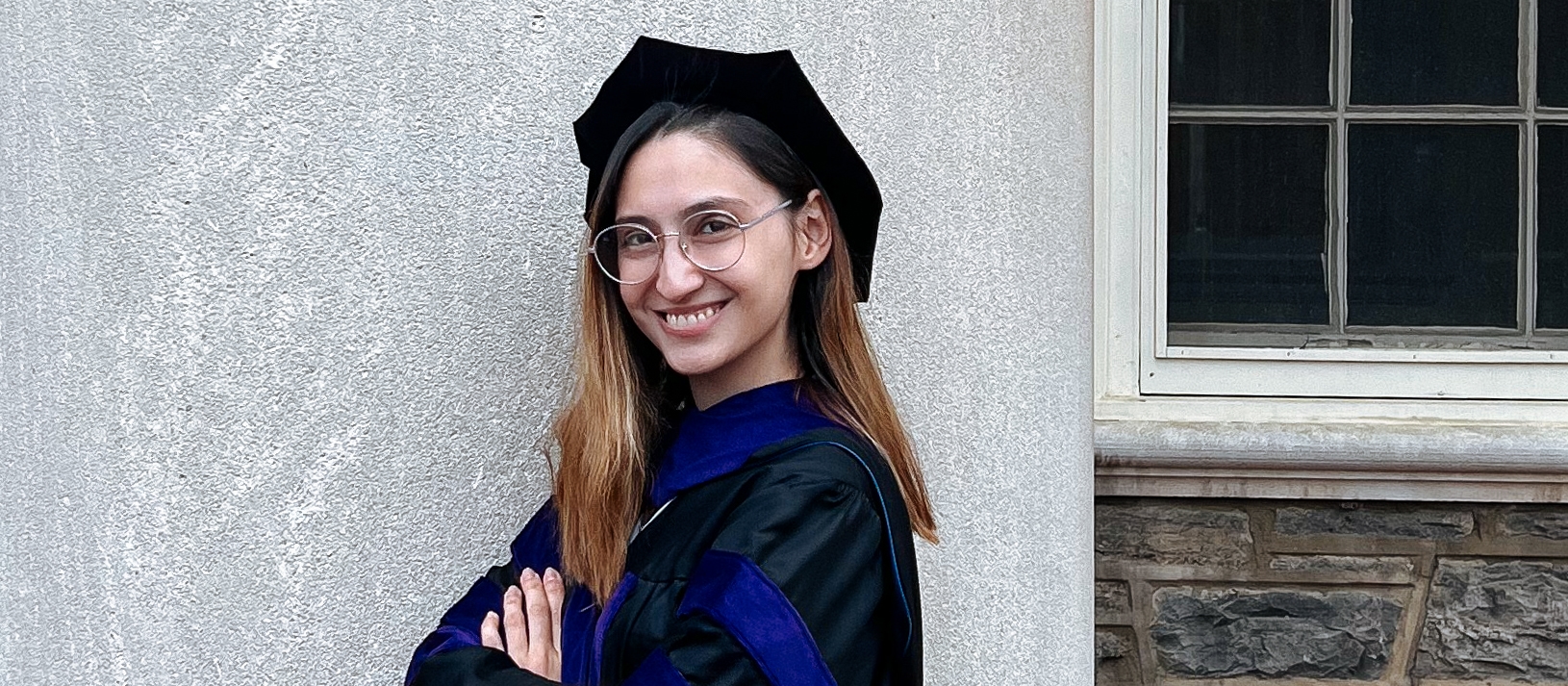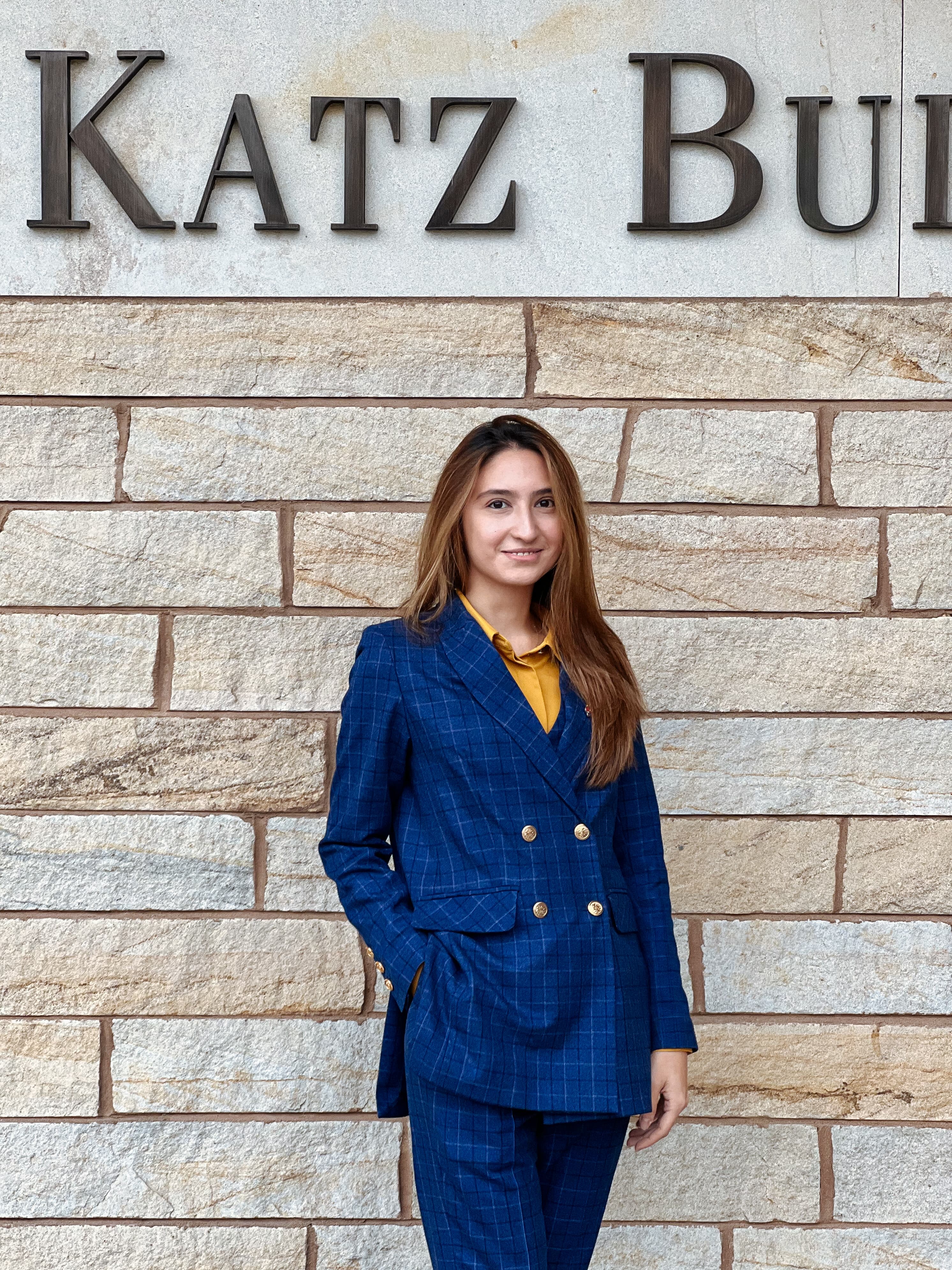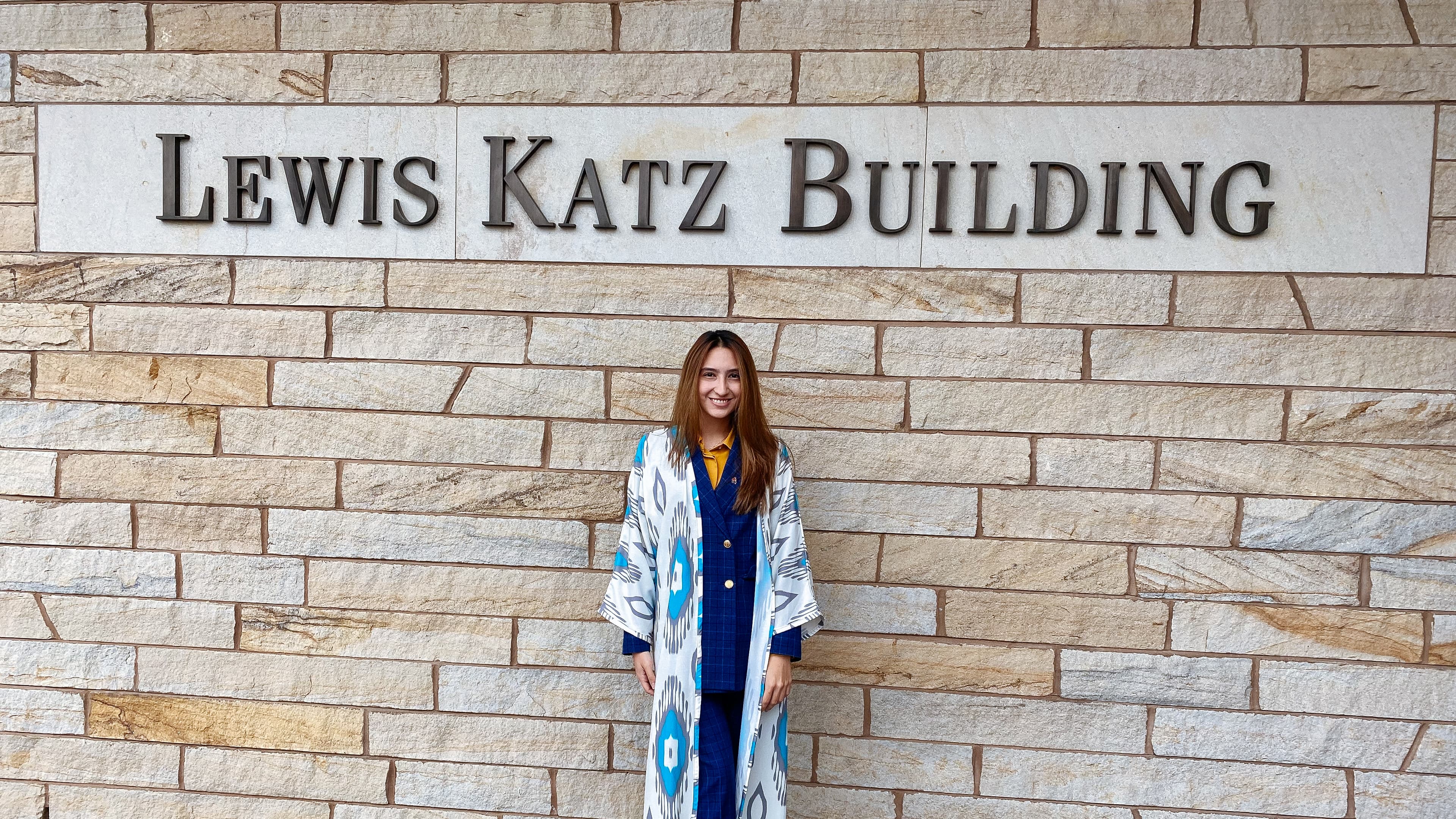When Fate Called, She Went Into Law
Even if she didn’t recognize it at first, she was always destined for a career in law.

Shakzhoda Tuychieva, above, shown in her graduation gown from Pennsylvania State University, where she received her Master of Laws degree, became the first person from Uzbekistan to enroll in Penn State Law in 2020.
Shakhzoda Tuychieva became the first Uzbek student admitted to Penn State Law in 2020—and now, as a doctoral-candidate at the University of Pittsburgh, she is redefining what it means to represent Central Asian voices in global legal spaces. This profile traces her journey from Tashkent classrooms to international arbitration halls.

Posing in front the Lewis Katz Building, home to Penn State Law School and the School of International Affairs, Tuychieva says that with law, “you need to listen … and analyze what you can help with, what you can do [to help others], what you can do for them, how you can solve their problems.”
It’s mid-morning, and from her desk at home in Pittsburgh, Shakhzoda Tuychieva is busy prepping for a day full of meetings. Within a few hours she will take part in a doctoral-student colloquium, and by late night she is set to participate in an international conference on the development of investment arbitration and its trends within Central Asia, hosted by her alma mater, Tashkent State University of Law (TSUL) back in Uzbekistan. It isn’t the load of work in front of that rattles her nerves. Rather, it’s the virtual experience that leaves her feeling anxious. “It’s much easier to present everything in person because you can concentrate on the audience, make eye contact and work with” those in attendance, she says.
But this is not Tuychieva’s first foray into public speaking. Having recently started in August of this year her Doctor of Juridical Science, the highest academic program in the United States, one level above a PhD, at University of Pittsburgh, the 24-year-old has spent her entire life readying for such opportunities—even if she didn’t immediately recognize it as her calling.
“My mom is a doctor, and my father an engineer,” says Tuychieva, adding how she would later become “the first lawyer in our family, basically the first lawyer in the last three or four generations.”
Yet, her father’s stories of her childhood remind her how she was fated for a legal career. Her father, she says, immediately after her being born easily discerned her future would be in law—a prediction she never took seriously growing up.
“I wanted to be a doctor. I wanted to be a journalist. I wanted to be a social worker. I don’t know how I ended up being a lawyer,” she admits.
I was into legal studies. I didn’t want to just start this [law school]. I was trying to make something more [of myself].Shakhzoda Tuychieva
But then in 2016, she enrolled at TSUL’s Bachelor of Laws program. By then, she had already accepted her calling and set out to make the most of a career as a lawyer. “I was into legal studies,” she says, adding how she didn’t “want to just start this [law school]. I was trying to make something more [of myself].”
That something more involved an active lifestyle that she admits conflicted with her naturally introverted character. By her sophomore year, she volunteered at the Center for Legal Assistance to Citizens in Uzbekistan’s capital city. Devoting at least 10 hours a week, she gave legal advice on civil, criminal and business issues. The experience alone helped her home in on her skills of listening. “You need to listen to their story,” explains Tuychieva of her time serving others, “and analyze what you can help with, what you can do for them, how you can solve their problems. It helped me with my solving skills” and communication.
In addition to the time she dedicated to serving others, she also devoted time outside of class—to experiences that would ultimately lead to a deeper understanding of law. She first offered herself as a vice-class representative, elected by her fellow classmates, and then added more time as a student union activist. The next year, in 2018, she joined the Young Analysts Club at TSUL, organizing and supervising roundtables, and preparing amendments into civil code and law. Her work outside of class taught her how to negotiate between students and university administration, as well as conduct research. More importantly, her activism allowed her to break out of her shell. “In one year,” she says, “I was presenting and introducing myself to an audience of about 200 people. In the next two years, it was 300. And I realized how strongly I changed myself. And I love this change. I loved this experience.”

Tuychieva sports a traditional ikat robe brought from her home country of Uzbekistan, called a chapan in Uzbek and traditionally worn over layers of clothes during the cold winter months.
It was this commitment to her extracurricular activities and experiences that inspired her to seek a Master of Laws (LLM) program at Pennsylvania State University (Penn State) in 2019. Although she started preparing for study abroad in 2018, by improving her English skills, taking the IELTS and gathering her documents, she states that what sealed her acceptance into Penn State’s law school was all the extra work she did. “This is not just like taking an exam and that’s it. … They look through everything, what you present of yourself.”
Even with all the extra activities, she thought she had little chance of being accepted into the program. Afterall, of the 450 students admitted to TSUL in 2016, when Tuychieva enrolled, only 50 were women, she says. The odds were stacked against her, but she never felt discouraged. Instead, she doubled down. In her personal statement for Penn State Law, she focused on the role of women in the legal profession, and that inclination paid off. That’s because, as she points out, admissions boards look for applicants who think outside of the box, as much as they do gender. “It’s not always about human rights, but it’s about gender equality.”
Penn State agreed. When Tuychieva entered Penn State Law, little did she realize she would be making history as the first Uzbek to study there.
Two years later, and after having recently finished her LLM at Penn State, she reflects on her journey. A path in law is much more than just about knowledge. It’s about socialization and putting oneself out there, she explains. “While I was in law school, I never thought I needed to be social, I needed to have friends. But it’s all about networking.”
While I was in law school, I never thought I needed to be social, I needed to have friends. But it’s all about networking.Shakhzoda Tuychieva
Her trajectory not only had her confront her own introverted tendencies but it opened her up to the world of arbitration. Now as a doctoral student at University of Pittsburgh, she looks forward to working on investment arbitration, “which is connection, interconnection, and its joint research of public international law and public, private law,” a considerable shift away from the gender issue that inspired her personal statement.
As Tuychieva considers a future career in law, she openly aspires to share her knowledge with others. Education, she admits, still drives her. “I want to give the knowledge I’ve gained, and I want to share my experiences,” she says, adding she is committed to helping “people find their path, and maybe it will help them find the destination they are looking for.”